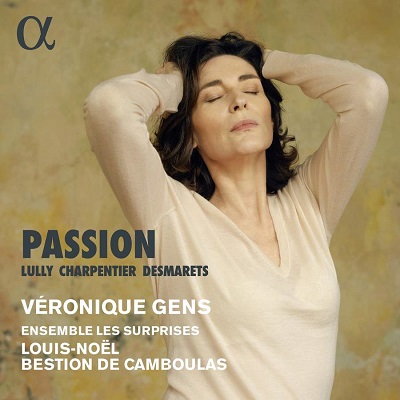Passion is an imaginary opera built around the music of Jean-Baptiste Lully, and three of his pupils and contemporaries. It’s the result of discussions between Baroque specialist Véronique Gens and conductor Louis-Noël Bestion de Camboulas, and their wish to record some well-known operatic extracts and a handful of previously unrecorded pieces by Pascal Collasse and Henry Desmarets. Within this scheme are three ‘characters’; the soprano soloist, the ensemble Les Surprises, and the Les Chantres du Centre du Musique Baroque de Versailles. With these choral, instrumental and solo forces, plenty of contrast can be found in terms of colour, sonority and weight all of which makes for rewarding listening, no matter where you start.
Louis-Noël has devised an ingenious ‘plot’ in which love, lamentation, jealousy and vengeance are vividly realised within a sequence of character portraits framed by five ‘acts’, to titles such as ‘The Call of the underworld’, ‘Cruel love’ and ‘Medea enraged’. The whole works well, providing you’re not hoping for a real plot. If one didn’t know any better, all the pieces could be by the same composer such is the disc’s stylistic homogeneity. This last aspect is well illustrated in the smooth transition from Lully’s ‘Air de nuit’ from Le Triomphe de l‘amour straight into Desmarets’s ‘Choeur du Sommeil’ from La Diane de Fontainebleau. A similarly neat segue occurs between two operas by Collasse: an aria from Achille et Polyxène, where Gens summons dark deities from the underworld, is followed by an invigorating storm scene from his opera Thétis et Pelée. Here, chorus and instrumentalists bring razor-sharp articulation to their evocation of raging winds. It’s a standout passage that brings sharp illumination to the tight ensemble of the combined choral and instrumental forces. The latter are heard to impressive effect in both Lully’s Ballet du Temple de la Paix and his light-as-air ‘Canaries’ from Le Bourgeois Gentilhomme.

Linking these independent but related movements is the additional idea of mining repertoire from the operatic careers of two late 17th-century singers – Mlle Saint-Christophe and Marie Le Rochois. They were renowned for their dramatic soprano roles within the Paris opera, with parts that mostly portray powerful women overwhelmed by their passions. Véronique Gens is mostly well-suited to the emotional pendulum that swings across this Lully-dominated disc. It’s a voice that breathes tormented life into the scene from Lully’s Armide where the enchantress Arcabonne seeks vengeance for her entombed brother. Outrage and despair are well defined in a characterful rendition. Gens brings a breathless quality to a weeping Aeolia in Desmarets’s Circé where, over a repeated bass figure, she mourns for the presumed death of Ulysses.
It’s all very approachable, but while Gens sings with consummate musicianship, her grieving in pertinent arias leaves me unmoved. Perhaps it’s unfair to expect a simpler, purer tone for restrained passages and avoid the slight vibrato that colours all she does. The result is somewhat one dimensional. I would have liked greater distinction of vocal colouring between emotional states. In this respect, she perfectly inhabits the Goddess Ceres in an extended rage scene in Lully’s Proserpine where she orders the destruction of crops as retribution for the capture of her daughter. There’s panache and passion in the excerpt from Act II of Lully’s Armide, yet another confrontation with heated emotions that, by this point in the disc, has just begun to become wearisome. By the time we reach music from Lully’s Alceste, the sense of indignation and hand wringing has worn thin, no matter how assured these performances are, and while the chorus is wonderfully devilish in Marc-Antoine Charpentier’s Médée, the overall conceit is laboured. What in theory is an intriguing experiment has become overworked. Sound quality is excellent and Benoît Dratwicki’s booklet notes assume you are familiar with the music.
David Truslove
Véronique Gens (soprano), Ensemble Les Surprises, Les Chantres du Centre du Musique Baroque de Versailles, Louis-Noël Bestion de Camboulas (director)
Excerpts from Charpentier – Médée; Collasse – Achille et Polyxène, Thétis et Pelée; Desmarets – Circé, La Diane de Fontainebleau; Lully – Amadis, Proserpine, Atys, Ballet de la Naissance de Vénus, Le Bourgeois Gentilhomme, Armide, Persée, Alceste, Le Triomphe de l‘amour.
ALPHA 747 [57.12]
ABOVE: Véronique Gens (c) Jean-Baptiste Millot